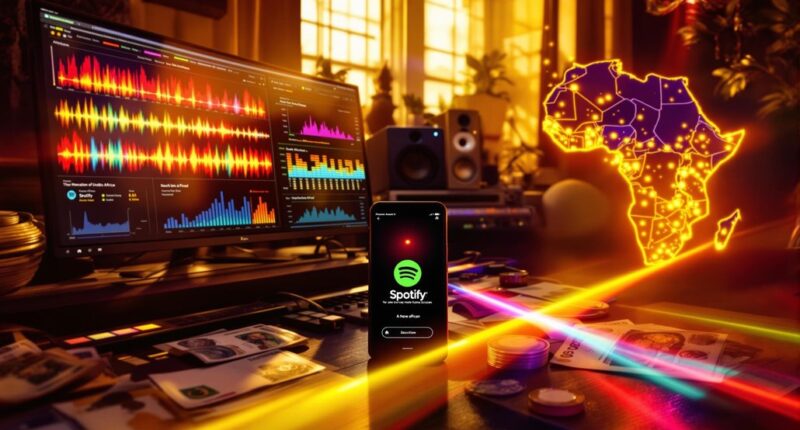Spotify distributed $59 million in royalties to African artists in 2024, with Nigerian musicians earning $38 million and South Africans receiving $21 million. Nigerian earnings doubled from last year, while South African payouts increased by 54%. These figures represent only 0.59% of Spotify’s global $10 billion distribution. The boom reflects growing international demand for Afrobeats and Amapiano genres. The success story showcases Africa’s expanding musical influence worldwide.
Millions of African musicians are seeing their bank accounts grow thanks to Spotify’s expanding global reach. The music streaming giant distributed $59 million in royalties to Nigerian and South African artists in 2024, highlighting the rising global demand for African music genres like Afrobeats and Amapiano.
Nigerian artists received $38 million (₦58 billion), doubling their earnings from 2023. South African musicians pocketed $21 million (400 million rand), representing a 54% increase year-over-year. These impressive numbers reflect just 0.59% of Spotify’s total global payouts of $10 billion.
The growth trends tell a compelling story. Nigerian royalties jumped 100% in just one year, while South African earnings grew by 54% in the same period. The number of Nigerian artists earning ₦10 million annually has tripled since 2022. Similarly, the number of South African artists earning between R100,000 and R500,000 yearly has doubled in the same timeframe.
Global playlist presence plays a key role in this success. Nigerian artists now feature in 250 million user playlists worldwide, while South African artists appear in 220 million playlists. Daily streams of South African music exceed 600,000 hours, with algorithmic recommendations helping listeners discover African music beyond regional borders.
African sounds echo across continents as algorithms connect listeners to rhythms beyond borders.
Export growth metrics further illustrate African music’s global appeal. Nigerian export growth reached 49% over three years, while South African export growth soared to 104% during the same period. International listeners now drive the majority of earnings for artists in both markets.
Strategic partnerships have helped fuel this growth. Telecoms like Orange offer data-free Spotify access in Francophone Africa. Ticketing and merchandise integration has generated $300 million globally for artists. This success reflects vibrant music scenes in Nigeria and South Africa that are gaining competitive advantage in global markets. Spotify has also adjusted local pricing in Nigeria to match market demands.
The streaming platform’s regional monetization strategies include tailored pricing in South Africa since its 2018 launch. These approaches help artists diversify income beyond traditional pre-streaming models. Researchers analyzing this trend should carefully cite multimedia references for audio recordings and albums when documenting the cultural impact of streaming platforms.
Key artists driving this trend include Nigeria’s Tems, Burna Boy, Davido, and Wizkid, alongside South Africa’s Tyla and DJ Maphorisa. Amapiano and Afrobeats remain the dominant streaming genres, with female artists gaining more prominence in playlist inclusions. Collaborations with international artists have amplified regional visibility.
As African music continues gaining traction globally, Spotify’s increased focus on the continent appears justified. The platform’s policies aim to reduce barriers to music streaming while creating sustainable income for a new generation of African artists.
Conclusion
As streaming music gains popularity in Africa, artists are seeing financial benefits. Spotify’s expansion in Nigeria and South Africa has generated $59 million in royalties for local musicians. This growth represents a significant opportunity for African artists to reach global audiences while earning income from their work. The digital music revolution continues to transform how artists across the continent share their talents and build sustainable careers.







